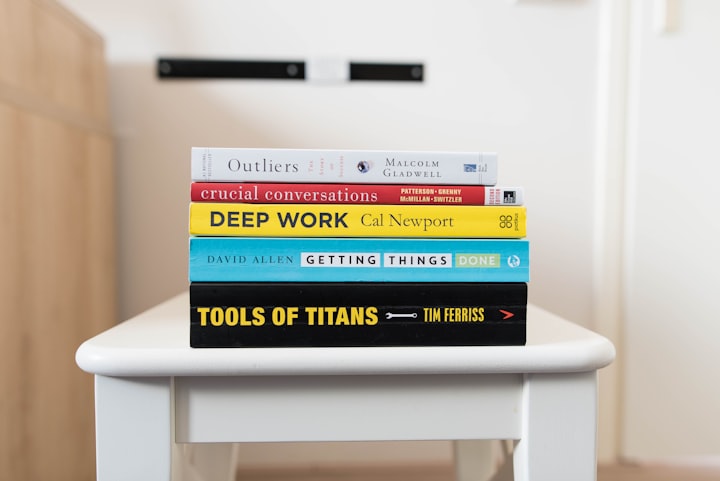15 Best Business Books for College Students to read in 2022
If college students want to start a business in the future, they need to read a lot of business books

Today I have selected 15 Best Business Books for College Students to read in 2022 to help you get in touch with the "business world" more closely and cultivate your "business smell"! After graduation, whether you choose a job or start a business, you need to be closely connected to the "business world".
If college students want to start a business in the future, they need to read a lot of books, because sometimes reading is to master knowledge, but more often it is to broaden their horizons and inspire their own thinking; therefore, it is recommended to read a lot during school, all walks of life Books in the field should be read.
If you simply want to learn business knowledge, then the first thing you need to know is some basic knowledge: such as business management, marketing, business models, and so on, but these basic concepts are often ignored by many people, or they are not I like to watch, in fact, these basic knowledge are very important, and you must have a good understanding in the early stage; in addition to some basic knowledge, you can understand the development history of some large companies, which can open up many ideas;
Habit, often pay attention to some news about business, business, technology, company, stock market and some blog posts, in-depth observation, etc. in the society; these are more practical things so that you can understand social business as soon as possible The overall situation, learn more about some business models in Europe and the United States, after all, many domestic business models are borrowed.
College students read some books on business and entrepreneurship, which can help them build a correct basic understanding of business and entrepreneurship.
The following are the books on business and entrepreneurship that I recommend must-read for college students. Welcome to read!
15 Best Business Books for College Students to read in 2022
Table Of Contents
1. Good to Great
2. How to Win Friends and Influence People
3. The Wealth of Nations
4. The Big Short
5. Lean In
6. The 7 Habits of Highly Effective People
7. The Lean Startup
8. Zero to One
9. Thinking, Fast and Slow
10. The Essays of Warren Buffett
11. The Effective Executive
12. The Intelligent Investor
13. The Tipping Point
14. The Four Hour Work-Week
15. Crossing the Chasm
1. Good to Great
Good to Great: Why Some Companies Make the Leap and Others Don't by Jim Collins
This book can actually be explained in one sentence: the only difference between an excellent company and an excellent company is who has a better corporate culture.
The so-called corporate culture is definitely not to do some posters in the company, to get some superficial things like newspapers, corporate culture is the value of a company. Whoever has better values can be more excellent. It's the same for people and businesses.
The best way to read this book is to go through the conclusions the book, and if you feel it in your heart, you will know it.
After reading this book, I also read "Foundation Evergreen", I personally evaluate "Foundation" in general. Wondering why "Foundation" can be so popular? Analysis of the reason: Maybe too many companies want to be evergreen, and there are many practitioners in these companies, so they constitute a considerable buying crowd.
This involves the positioning of companies and entrepreneurs: whether they plan to do it for a long time, or do it well for a few years, then stop. Personally, I think: the long-term is not necessarily the only option.
Most people hope to use the company's success to achieve a personal heroic history of success. I think Good to Great comes to a better conclusion: Great companies don't come from a charismatic, heroic leader.
This is actually the basic assumption of the character of a great leader (strong): the company is more important than the individual. The future of the company is higher than that of the individual.
And these characteristics are often by nature, and it is hard to say whether they can learn them. Therefore, whether people can self-transcend self-adjustment is the key to the problem.
So, how many of today's promising Internet companies can go from good to great?
2. How to Win Friends and Influence People
How to Win Friends & Influence People by Dale Carnegie
In my senior year, my reading habits benefited a lot from Gillian. He said that when reading a book, half of the energy is spent thinking about these questions: Who is this author? What has he done? For what purpose does the author write this book? How is its reliability?
Carnegie was not a philosopher, he was a successful scientist, an adult education expert. To put it bluntly, the work he did at that time was similar to that of a lecturer hired outside the company to train new employees.
I also went to Google to find some information about him. I think the achievements he has made are too exaggerated. In my opinion, he just did his best work in the industry when adult education was not well-established, and at the same time he had his own uniqueness in this area, and then wrote it into a book.
The book 'How to Win Friends and Influence People. Carnegie's purpose for writing this book is clearly stated in the preface: "I know what those adults want (the ability to deal with people). But the book they need has never been written."
At the same time, he also made it clear that this book is not a rational lecture, but teaches you how to do it. "This is an action book"
There is very little truth in the whole book, most of which are some cases or stories. Two are the most impressive, one is a letter Lincoln wrote to Meade at the height of the Civil War, and the other is Roosevelt calling a neighbor to ask her to see bobwhite.
There are detailed details in the book, so I won't repeat them here. I find these detailed stories taken from great men to be more convincing. That's the reason those great people are great.
Books are good books, not cryptic or flashy. Recommend to everyone.
3. The Wealth of Nations
The Wealth of Nations by Adam Smith
Although this book is said to be a work of economics, economics will always be inseparable from politics. The author wrote this book at a tense moment before the outbreak of the American Revolutionary War.
If the method proposed by the author could be realized, perhaps the world map today would be very different. The British government just chose a short-sighted approach, which caused the United States to independent.
Adam Smith believed that: as a country, the United Kingdom has absolutely no need to limit the capital to England but should treat all areas in the empire as equals. Where the tax is more, the number of parliamentarians should be more.
Finally, the capital of the whole country should be the same. You can move to the area that pays the most taxes. If this ideal is realized, I am afraid that the United States will now be a big Britain.
In addition, with regard to colonial management, also allows us to understand the position of Western governments from another aspect.
According to Adam, colonial companies like the East India Company did not have the relationship with the government as we thought. In fact, such a company is deceiving the top and the bottom.
On the one hand, it deceives the trust of the government and obtains huge loans and exclusive trade rights, and on the other hand, it oppresses the local people in India. Get any benefits, and the people of India suffer even more. So, where did the money go?
It was all wasted and corrupted by the people of the East India Company. Simply put, the whole world did not get the maximum benefit from such colonial policies, and such policies seriously hindered the development of the world economy, that is to say, made the world poor.
Therefore, the post-war anti-colonial movement has its natural rationality. Even for an old colonialist country like Britain, the anti-colonial movement is not only a bad thing but a good thing.
Adam Smith is known as the originator of modern economics, so this book has established the theoretical framework of modern economics.
In this book, various aspects such as division of labor, currency, prices, and taxes have been discussed in detail.
After reading this book, I have a feeling that modern economics has been completely established in him, and so many modern economists are only refining and abstracting his work.
Adam Smith's familiarity with the social situation at that time and the historical data is simply amazing. Everywhere there are detailed data to confirm his theories, and his incisive analysis of social facts can be seen everywhere.
This is a feeling I get from reading the works of most of the great scholars, that is, their knowledge is very detailed, and they all start from the facts. This is the most useful thing I have learned from this book. Before, I always wanted to do big things.
4. The Big Short
The Big Short: Inside the Doomsday Machine by Michael Lewis
The #1 New York Times bestseller: a brilliant account—character-rich and darkly humorous—of how the US economy was driven over the cliff.
When the crash of the US stock market became public knowledge in the fall of 2008, it was already old news.
The real crash, the silent crash, had taken place over the previous year, in bizarre feeder markets where the sun doesn't shine, and the SEC doesn't dare or bother, to tread: the bond and real estate derivative markets where geeks invent impenetrable securities to profit from the misery of lower- and middle-class Americans who can't pay their debts.
The smart people who understood what was or might be happening were paralyzed by hope and fear; in any case, they weren't talking.
The crucial question is this: Who understood the risk inherent in the assumption of ever-rising real estate prices, a risk compounded daily by the creation of those arcane, artificial securities loosely based on piles of doubtful mortgages?
Michael Lewis turns the inquiry on its head to create a fresh, character-driven narrative brimming with indignation and dark humor, a fitting sequel to his #1 best-selling Liar's Poker.
Who got it right? he asks. Who saw the real estate market for the black hole it would become, and eventually made billions of dollars from that perception?
And what qualities of character made those few persist when their peers and colleagues dismissed them as Chicken Littles?
Out of this handful of unlikely—really unlikely—heroes, Lewis fashions a story as compelling and unusual as any of his earlier bestsellers, proving yet again that he is the finest and funniest chronicler of our times.
5. Lean In
Lean In: Women, Work, and the Will to Lead by Sheryl Sandberg
I don't know how to start the story. All I can say is that I have a girlfriend who has experienced a midlife crisis of beauty.
She is so beautiful, looking forward to her appearance, she is slender and beautiful, and she can attract attention anywhere.
She has a gentle personality, funny words, likes music, writes novels by herself, has a husband who loves her very much, and has a very interesting job.
Everything was perfect except for her upcoming 28th birthday. How old is a man's midlife crisis? It should be 45 in "American Beauty" and 50 in "Shall we dance".
When you feel that life can only keep going downhill, you will really be desperate to grab something. This feeling is even stronger when you are used to having a lot.
I recently read 2 books related to women: "Lean In" and "So What About Thirty-One". The former tells me that there are many choices in this world, but don't hold back just because you are a woman.
Fight for whatever you want. You can work until the day you have a baby, or you can work harder than everyone else. You have to lean in, sit on the table, keep your hands up, cry a lot and move on.
Knowing that you are a woman doesn't mean you have to sit at home obediently and define your role from the very beginning.
You can still take risks, take more responsibility, and strive for more things. Rights and obligations are always in balance, and in order to be free, you cannot depend on others.
How will I live? This sleepless night, I can't define my own rules. I can only vaguely think, at least not marrying and having children as the greatest success, nor showing a good life to others.
Be honest with yourself, be brave, and strive for what you really want. For the rest, just pray that the world treats me kindly.
6. The 7 Habits of Highly Effective People
The 7 Habits of Highly Effective People: Powerful Lessons in Personal Change by Stephen R. Covey
In any case, the easiest person to change is yourself. Learning good habits is the beginning of success.
When everyone grows up, most of them will experience the process from dependence to independence, from independence to mutual dependence. Learning different behaviors can change the gate of destiny.
The 7 Habits of Highly Effective People tells us what to do and how to do it. The seven habits are:
[Habit 1: Be proactive]
Only when a person is responsible for himself can he be responsible for others; only when a person has his own principles and values can he be respected by others. Believe in yourself, go all out to do things, be passionate and energetic, and you will infect those around you. Everyone chooses to create their own life, which is also the most basic decision of everyone.
[Habit 2: Persistence]
Sometimes, the hardest thing for people is to stick to their original dreams.
[Habit 3: Important things first]
The most precious thing in the world is time. Time management skills determine your success or failure. What must be done on your own, what must be delegated to others, what must be thought out in advance, and what must not be considered? The better you are at judging and dealing with it decisively, the more efficient you will be and the more obvious your value will be.
[Habit 4: Win-win thinking]
Get rid of the military mentality of life and death, establish extensive cooperative relations, and use competition and cooperation to build a good ecological environment. The ancients said that to suffer is to take advantage.
[Habit 5: Know each other and know yourself]
Sincere communication of the mind can enhance understanding and friendship. Doing things is being human.
[Habit 6: Be Eclectic]
Bring together the wisdom of everyone, and use it for your own use. To achieve a lofty goal is often not achieved by oneself. Those who make good use of the strength of the team are the real smart people
[Habit 7: All-round development]
Life is so important, so don't take it too seriously.
About the Creator
Muhiuddin Alam
I'm Muhiuddin Alam, a blogger and content writer. Explore book recommendations and reviews of fiction, novels, and nonfiction on your trusted site ReadingAndThinking.com. & Geek Book Reviews.com






Comments
There are no comments for this story
Be the first to respond and start the conversation.